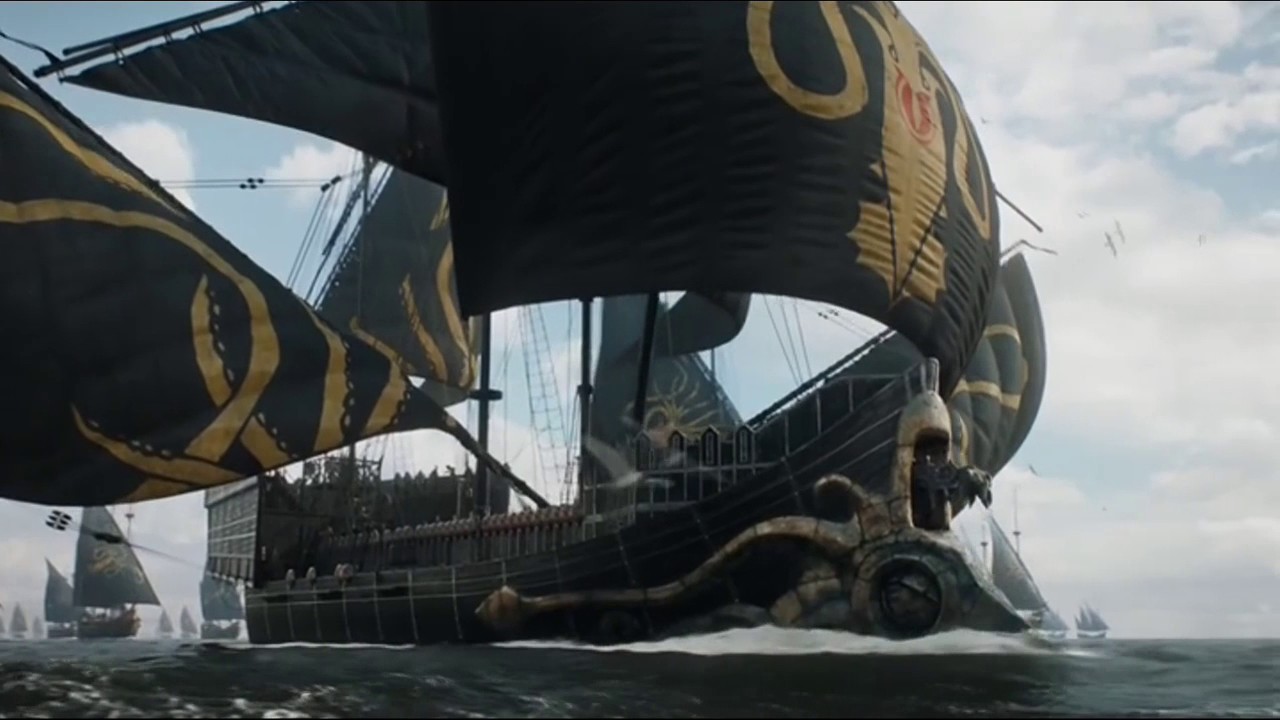While waiting impatiently for the next season of The Man in the High Castle, I've been re-watching Game of Thrones. Given that HBO has put off the final season by a year, and George R. R. Martin is now tentatively scheduled to deliver the final books sometime in the year 2030, I'm picking up a few of the tidbits that I missed the first time around.
A great example came up sometime in Season Six. Strife in the Greyjoy household! Uncle Euron comes home, murders his brother, and assumes kingship of the Iron Islands. Theon and Yarra, his niece and nephew, steal the best ships from the Iron Fleet and sail away, presumably with a significant number of the island warriors.
Uncle Euron is undeterred, however. He holds forth with a rousing, inspirational speech, which ends with, "Build me a 1,000 ships, and I'll <something something something about conquering the world.>"
Um, say again? Build 1,000 ships?
Yep. Euron commands all hands on deck. Every man felling trees, cutting lumber, and banging ships together. Every woman stitching sails and weaving rope. Apparently it's just that easy. Time is a bit murky in the GoT world, but it's certainly only weeks or months before Euron is sailing with a massive armada that decimates Yarra's fleet.*
It occurred to me that I've actually seen this episode many times, and not just on HBO. Operations, and BI in particular, are often the subject of the "Let's just dive in and do it in no time!" mentality. We've got a business problem that we didn't anticipate. Someone thought of a major new initiative while showering. Or worse, someone attended a workshop, saw some cool data visualizations that a vendor spent months building in the app they're trying to sell, and wants something similar in the ecosystem -- tomorrow.
"Build me 1,000 KPIs, and I'll give you the Seven Kingdoms!"
Here's the problem: building a ship isn't that easy. There are plenty of skilled trades involved in shipbuilding, and even with motivation provided by leadership's "can do" attitude**, the application of massive manpower rarely makes up for the correct skill and experience. One hundred foot soldiers can't significantly speed up the proper shaping of a keel, and if the keel is faulty, the ship is ineffective.
Likewise, a dozen vendors who know nothing of your business and data can't slap a quality BI infrastructure together overnight. So, how about pouring on the labor from the opposite direction? Open up the BI platform to those who have the business knowledge, if not the technical skill. After all, your account managers, team managers, and sales folk can just pick up some data skills with an hour on Lynda.com, right?***
There's a big difference between using a tool daily and having the skills necessary to build the tool. Most sailors spend a great deal of time onboard a ship, one might expect, and they're probably aware that it's supposed to float. Put them in charge of building one, and it'll probably have as auspicious a career as the CSS Neuse.****
Of course, you may be thinking that this is a terrible analogy because Euron Greyjoy's team DID finish 1,000 ships in virtually no time, smashed the Iron Fleet, and captured a bunch of key enemy leaders. Don't forget -- Game of Thrones is fiction. And fantasy. Reality would have made that subplot would have made that subplot a bit anti-climactic, when Euron's armada set forth and promptly sank.
Strong leadership hires strong specialists, then paves the way for those specialists to do a quality job. Cut corners and throw wrongly skilled labor at your projects, and you may as well wait for the dragons to fly in and save the day.
* I'm not apologizing for "spoiling" an episode that's been out for over a year.
** Or the motivation provided by Uncle Greyjoy's "do it or die" attitude.
*** I also don't believe that 1,000 monkeys on 1,000 typewriters will recreate the works of Shakespeare. However, they probably could come up with the NFL's rules on what constitutes a catch.
**** It's an interesting story. Look it up; you can thank me later.
